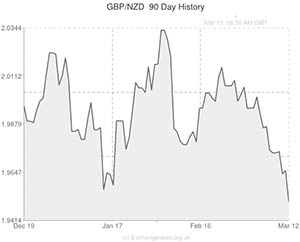
The Pound to New Zealand Dollar exchange rate (GBP/NZD) tumbled by around two cents last night to a near-4-month low of 1.9407 as markets reacted to a 25 basis point rate hike from the Reserve Bank of New Zealand.
RBNZ Governor Graeme Wheeler said that the Bank will make further increases to the benchmark interest rate, which now stands at 2.75%, at future policy meetings to help guide the New Zealand economy forwards at the appropriate pace:
“By increasing the OCR as needed to keep average inflation near the 2% target mid-point, the Bank is seeking to ensure that economic expansion can be sustained”.
Wheeler’s hawkish Central Bank statement also featured an upgrade to this year’s GDP estimate, from 2.9% to 3.4%, and a positive revision to the New Zealand Dollar’s trade-weighted index, which is currently at an all-time record high of 79.86.
With the RBNZ Official Cash Rate set to be raised by a further 75 basis points by the end of the year, and another 200 basis points over the next two years, investors piled into the New Zealand Dollar to take advantage of the currency’s profitable yield values.
Due to a triplet of encouraging economic conditions the New Zealand economy is improving rapidly, allowing the RBNZ to become the first Central Bank in the developed world to exit record-low borrowing costs:
1) The rebuild from the Christchurch earthquake has created an abundance of job opportunities and massively boosted construction contracts. 2) The nation’s capital city Auckland is experiencing a housing boom. And 3) The price of dairy produce, which is New Zealand’s biggest export, is rising rapidly.
The New Zealand Dollar rallied by just over two cents during the Asian session in response to the hawkish policy decision and statement.
In addition, the ‘Kiwi’ Dollar rose to a fresh all-time high against the Japanese Yen (NZD/JPY), a 10-month high against the US Dollar (NZD/USD), a 1.5-month high against its Antipodean counterpart the ‘Aussie’ (NZD/AUD), an all-time high against the Canadian Dollar (NZD/CAD) and a 1-week high against the Euro.
It was also announced last night that the Australian Unemployment Rate remained at 6.0% during February, as expected, but that 80,5000 Australians found full-time work last month. The upbeat labour market figure gave the Australian Dollar a boost, forcing GBP/AUD down by around -1.3 cents to a monthly low of 1.8345.

Comments are closed.